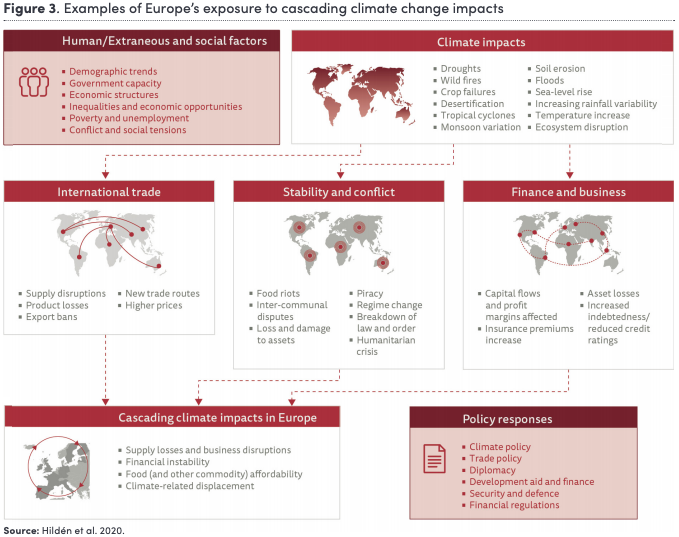Climate-resilient trade and production: the transboundary effects of climate change and their implications for EU member states

Introduction
COVID-19 has revealed with startling clarity the vulnerabilities inherent in a globalised world, including how risks can leap across sectors and national borders, with profound political, economic and social consequences. European businesses and consumers today rely heavily on complex supply chains and just-in-time production and delivery, which can be disrupted by shocks, compound events, and long-term shifts elsewhere in the world.
From this perspective, the pandemic offers crucial lessons on how to address climate change. Like COVID-19, it can spur chain reactions, threatening food security, livelihoods and wider health and well-being. In a warming, interconnected world, increasing the resilience of global trade and production systems is paramount.
This brief* provides an overview of the state of knowledge on transboundary climate risks in Europe, and explores how this knowledge could help Member States, businesses and the EU as a whole to advance climate-resilient trade and production. Findings and recommendations will inform the development of the new EU Adaptation Strategy and the ongoing EU Trade Policy Review, as well as national efforts to adapt to climate change. These findings and recommendations have been shaped in part by an online seminar with adaptation and trade representatives of EU Member States, the European Commission and other international organisations, which was held on 9 July 2020. This seminar, titled “Climate-Resilient Trade and Production”, was hosted by theStockholm Environment Institute on behalf ofAdaptation Without Borders, in collaboration withCASCADES.
*The key messages from the brief are provided below.Download the full brief from the right-hand column.
Key messages
- Climate change impacts around the world are already creating cascading risks that intersect with trade patterns and international supply chains. These risks can reverberate across the global economy and pose a growing challenge for EU Member States.
- Several European countries have conducted assessments of transboundary climate risks but have yet to develop policy responses based on the resulting insights. This is a complex task, involving a wide range of public and private actors, within and outside the EU. Three key priorities should guide decision-making: effectiveness in reducing risk; a clear designation of responsibility; and fairness in the distributional impacts of the policies’ effects.
- The EU is well placed to support Member States in identifying, managing and reducing transboundary climate risks by developing innovative governance mechanisms; creating common methodologies and guidance; fostering cross-sector and international cooperation; and harnessing new strategic partnerships.
- Addressing transboundary climate risks fits well with the European Green Deal and the EU’s COVID-19 recovery plan, which aim to create a more sustainable, inclusive and climate-resilient economy. The EU Adaptation Strategy and the Trade Policy Review present important opportunities to build a global European economy resilient to transboundary climate risks, in recognition of our interdependent world.
Suggested citation
Adams, K., Harris, K., Klein, R.J.T., Lager, F. and Benzie, M. (2020). Climate-Resilient Trade and Production: The Transboundary Effects of Climate Change and Their Implications for EU Member States. Adaptation Without Borders Policy Brief. SEI, ODI, IDDRI.

Comments
There is no contentYou must be logged in to reply.